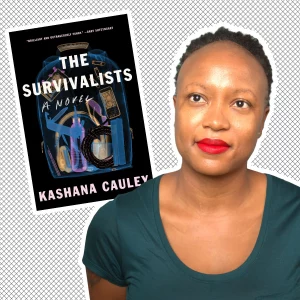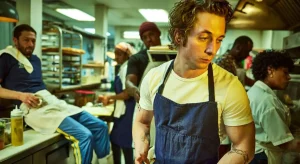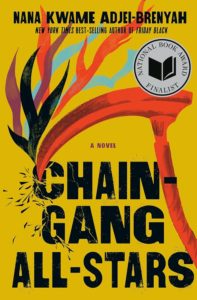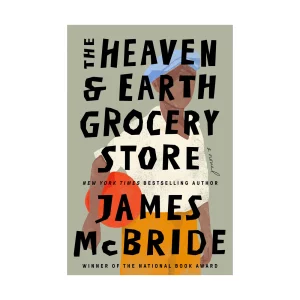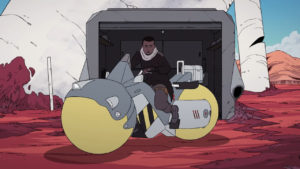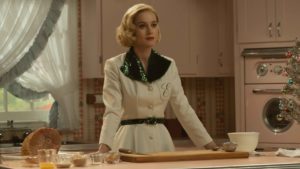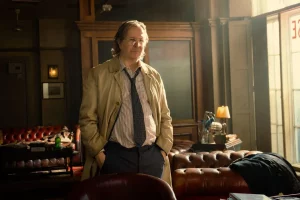The preponderance of books and television series cited below suggests that I still don’t get out as much as I should. And while COVID isn’t going away (and did, in fact, bite me sometime earlier in the year), there’s still so much to behold in person as opposed to a screen. Or a page.
Still, I did, for the record, travel more than usual in 2023, mostly to northwesterly places on the continent where I saw bears, moose, elk, glaciers, and geysers. By my count, I still have twelve states in the union to visit in my lifetime and sustain the hope, however faintly it is articulated these days, that there will still be a union for as long as I hope to live.
Still.
If democracy is under siege and things are as bad as cable news networks insist (I don’t think they are, but that’s another discussion for another time), it’s not because culture failed us. The items below, even though they represent a relative sliver of what’s available, all tell eternal truths in up-to-the-minute fashion. Even when they depressed me, they gave me hope. So, the lesson here is a clear one: Stop watching cable news. Watch and – especially, for the love of God – read stuff like this. You’ll feel better. You’ll know more. That’s the best I can say. The rest, especially in 2024, is up to you.
Once again, these are in no particular order:
The Survivalists – Another outstanding year for African American fiction – and, at this point (for varied reasons), why don’t we just say, “American fiction,” period? – began with this silken-swift comedy of manners that’s as dark, rich, and intensely stimulating as the gourmet coffee that, along with heavy artillery, is a major trope in Kashana Cauley’s novel. Its central character is Aretha, a fast-tracking corporate attorney whose peripatetic love life seems finally to have found mooring with Aaron, the dashing founder-proprietor of Terminal Coffee, which roasts and sells coffee from his home base in Brooklyn’s Fort Greene neighborhood. Beyond mutual infatuation, Aretha and Aaron are such kindred spirits in their droll hipness, Type-A impulses, and wily diffidence that she moves into the commodious old rowhouse he shares with two somewhat singular housemates: Brittany, a churlish, taciturn “Angry Flo-Jo” who’s responsible for assembling the backyard bunker, and James, a sullen, pallid ex-reporter fired from the Washington Post for plagiarism. It turns out this motley band is warehousing more than coffee beans. There’s also a deep, wide stash of guns and ammo, part of which they’re hoarding as protection from an as-yet unspecified urban apocalypse while the rest is being sold to all manner of dubious buyers in the Tri-State area. Aretha at first keeps a respectful distance from the gunrunning business. But when her hitherto upward trajectory towards full partnership hits the ceiling, Aretha throws herself into Terminal Coffee’s off-the-books operations – and becomes scary-good at it. Cauley, herself a lapsed attorney who was once a Daily Show staff writer, nails down rueful insights about cultivating high ambitions in cloistered times and tallies the ironies in striving for space in a future you otherwise fear and loathe. In other words, it’s about living one’s best possible life near the upper reaches (and below the radar) in the 21st century.
The Bear – I’m going to imagine that at some point during the filming of the second season of The Bear that the ghost of John Cassavetes somehow made it to the Chicago locations where the series was being shot. He (it?) likely felt very much at home, especially within the intimate, more ramshackle surroundings like the restaurant kitchen being ripped apart to make room for a newer, sleeker, higher-end eatery than the one it’s replacing. So much of him yearns to assume corporeal form even for a minute or two, if only to offer advice, encouragement, maybe a few suggestions, once he can find out the storyline, the schedule, and what the theatrical specifications are. First off, he probably can’t believe this is all being made for television. Then, with sheer wonder, he thinks: These kids really know what they’re doing. He is especially galvanized by Ayo Edebiri, who plays the precocious young chef Sydney. Despite her age, she seems the wisest, worldliest person among her stressed-out colleagues; except for those times when she isn’t, and her own insecurities come at her from unexpected places, like muggers in dark alleys. His attitudes towards The Bear’s male leads are more complicated. With both, it’s like staring at a looking glass. Jeremy Allan White’s portrayal of Carmen (“Carmy” or sometimes just “Carm”) Berzato, the perpetually frustrated genius-chef stalked by guilt, haunted by death, keeping fear of failure at bay, is the kind of soulful, belligerent savant Cassavetes used to play all the time. He’d have nailed his role down like an iron fencepost back in his day. The other guy, Richie (Ebon Moss-Bachrach), Carmen’s best bud and restaurant manager, is also a role made for him, meaning the self-sabotaging stick-of-dynamite with the short fuse who needs just one more thing to go south for him to blow himself up and everybody else with him. All these three kids with dreams way bigger than they can carry without tripping on the curb are magnificent creations. But Cassavetes knows they’re not even all of it; it’s also the family background, which all comes to a head in that bravura Christmas episode with the Feast of the Seven Fishes. The ghost thinks: That was something I could have never pulled off the way they did. It managed to fire all over the place and still come through ferociously contained. And besides, Cassavetes thinks, even I wouldn’t have had the stones to end the whole episode with the mother driving a car through the living room. And that the mother was played by somebody you only gradually recognize as Jamie Lee Curtis, but in another time and place, could have easily been Gena Rowlands.
The Chain Gang All-Stars – I’ll admit it. There’s this teeny, microbe-sized Imp-of-the-Perverse way down deep inside me that’s tempted to wonder, if for no more than a nanosecond, whether the alternate universe depicted in Nana Kwame Adjei-Brenyah’s ingeniously dystopian first novel is onto something: that giving the most abject violent criminals in custody the option of fighting televised duels-to-the-death would be something of a win-win situation for them and for a society that can’t get enough of real-world violent spectacle. Before you judge me, you should know that at least one reviewer of Adjei-Breyah novel opened the piece by asking whether he was having too much fun reading about a world in which there is such a thing as a Criminal Action Penal Entertainment (CAPE) program and that such a world could all too easily adapt its moral compass to take in pay-per-view packages showing wanton, all-out bloodshed between otherwise doomed convicts, some with their own fan bases and merchandise. It may not be the kind of thing I’d shell out my hard-earned streaming dollars for, but the fact that I can imagine as easily as Adjei-Brenyah does fans of all ages having wall-poster-sized devotion to gladiators like Loretta Thurwar and Hamara Stacker a.k.a. “Hurricane Staxx,” who, inconveniently, are lovers as well as competitors. In addition to these awkward situations, Adjei-Brenyah is conscientious enough in his world-building to conceive a web of corporate enablers of his madness from all-sports cable networks to the incarceration industrial complex (which is what I’m calling it this week anyway). The heretics travel along with a protest movement stalking the CAPE caravan at every stop on its tour, making some of the arguments you can hear in “real life” about the malign growth of the private prison industry and the seemingly impermeable hold that mandatory sentencing, capital punishment, wrongful convictions, solitary confinement, and other, similar aspects of the “real” legal system has on those who want their loves ones protected. At what point, one asks, does “safety” itself become its own kind of prison? Part of Adjei-Brenyah’s purpose is to arouse such self-interrogations in his readers – who, in turn, could subdue their own meaner instincts enough to ask more questions of our society and ourselves. So you can question your fears…
The Heaven & Earth Grocery Store – …or you can engage with your hopes. We were as urgently in need of James McBride’s depiction of collective strength and courage in the 20th century as we were of Adjei-Brenyah’s more acerbic alternate vision of the 21st. McBride follows up his 2020 triumph, Deacon King Kong, with another exuberantly polyphonic novel in which a community, if not the notion of “community” itself, is the protagonist. It’s a murder mystery set off in 1972 by the discovery of a skeleton, along with a mezuzah, found at the bottom of a well in the Chicken Hill section of Pottstown, Pennsylvania, once a lively, tumble-down community of mostly Jewish and African American residents. The narrative steps back more than 40 years before when Moshe Ludlow, a Romanian Jew owned and operated a theater and dance hall while his American-born wife Chona ran the eponymous grocery store nearby. Events are set in motion when Nate Timblin, a Black employee at Moshe’s theater, asks the couple to shield an orphaned and deaf 12-year-old boy child Dodo from state officials seeking his institutionalization. Moshe is reluctant, but Chona, a woman of deep compassion and iron will, insists, despite threats, explicit and otherwise, from the city’s white power structure, many of whose members disdain the easy-does-it interaction between Chicken Hill’s ethnic minorities to the point of taking part in Ku Klux Klan parades. In clumsier, hammier hands than McBride’s, this is the kind of story whose melodramatic elements can be ramped to needless excess. But here, as McBride’s previous work, it is his exquisite sense of tone, timing, humor, and nuance that allows the novel to earn our tears — and our faith in each other, whenever we need it.
Lily Gladstone – Screen stars always emit a field of magnetism that at once draws us in and keeps us at a distance. With Gladstone, these warring elements somehow merge into an aura of repose that’s eerie to behold. Her less-is-more triumph in Killers of the Flower Moon is powerful and dominant enough on its own elemental terms as to all but redefine the very nature of bravura performance. She is a virtuoso of stillness in ways that harken all the way back, if you can imagine it, to Buster Keaton and other silent-movie icons. And not even they could convey with their faces whole landscapes whose emotional weather systems can shift from wary to vulnerable to kittenish to sensual to bemused, braced throughout by resilience whose sources are probably a mystery even to her. Perhaps one way to account for this composure is Gladstone’s portrayal of
Hotki in Reservation Dogs. As jail-bound mother to Danny, whose suicide pitches the series’ teenaged characters into upheaval, anxiety, and confusion, Hotki has distanced herself emotionally and otherwise from everyone in her family except for her niece Willie Jack. When in the series finale Willie Jack brings Hotki an “offering” of snacks and sodas, the “auntie” summons the spirits of the ancestors passing on to the younger woman the obligation of looking after the friends and family members most in need. Once again, a majestic act carried out with understated humor and minimal flourish. She’s a trickster goddess with more surprises in store for us.
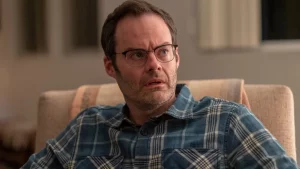
Barry – Of the hustlers, victims, losers, loners, narcissists, innocent passersby, and low-life sharpies making their way through four seasons of auteur-star Bill Hader’s inky, deadpan tragicomedy, none was as manipulative or as disingenuous as Monroe Fuches (the amazing Stephen Root), friend-mentor of Hader’s Barry Berkman, the mentally-unbalanced ex-GI who was guided by Fuches through an underground career of lucrative assassination before Barry decided he’d rather be a professional actor. Towards the conclusion of this so-dazzling-it-physically-hurt-to-watch-it season, Fuches, who emerged as something of a crime capo following some hard prison time, confronts his Chechen counterpart Noho Hank (Anthony Carrigan), whose bumptious naivete was darkened and deflated when he was forced by his own bosses to abet his lover’s murder. Now Hank and Fuches are haggling over who gets to kill Barry. (The “why” would take too long to get into here, requiring a rehash of Dostoyevskian proportions). It’s enough to say that Fuches, perhaps more than any other character in the whole sordid story, has arrived at something close to a complete reckoning for his many abysmal acts and is best able to assess where he’s landed in life. And why:
“I used to think I was a soldier, ignoring the fact that I never fought a battle in my whole life. I was a poseur. And I thought myself a mentor fostering other men’s natural abilities. But it wasn’t until I was in prison, and I got beaten to within an inch of my life day after day that I finally cut the bullshit and just accepted who I am: a man with no heart.”
Now, Fuches wants Hank to reach the same self-realization:
“I walk away, You’ll never hear from me again. All you have to do is admit that you killed Cristobal, admit that you fucked up, admit that you were scared, that you hate yourself, that there’s some days you don’t think you deserve to live. And the only thing that’ll make you forget is by being someone else.”
Hank wants none of it. There are consequences.
Now, this wasn’t how the series ultimately ended. Still more grisly jolts are in store. But it figured that Fuches would use his curtain call to sum up the self-deluding, perpetually denying soul of present-day America. Keep his monologue in mind as 2024 unravels like a soggy bedsheet.
Scavengers Reign – Further proof that science fiction flourishes best in a television series format, the better to let ideas and themes grow, bend, and metamorphose in the same manner as the flora and fauna on the planet Vesta Minor, where survivors of the calamitous wreck of the cargo ship Demeter 227 are scattered and struggling to cope with the planet’s astounding and hazardous ecosystem. Horror and wonder are weaved into Joseph Bennett and Charles Huettner IV’s conception with as much fascinating dexterity as the characters’ complications which are themselves transformed by the intractable natural elements coming at them from all sides. Even Levi, the dutiful and empathetic AI, is as susceptible to transformation through Vesta’s organic matter as the humans. Whether the changes are good or bad are difficult to gauge; in fact, “good” or “bad” turn out to have as little use in classifying the survivors as the wildlife. The gorgeous animation, owing as much to the comic strips of Jean “Moebius” Girard as to the films of Studio Ghibli, keeps you alert to illumination and revulsion. Because of the relentless progression of new exotica at every narrative corner, you shouldn’t be surprised if, upon encountering the first of this series’ 12 installments, you find yourself compelled to stay with it all the way through. Nor should you be surprised if, after you’re done, you have a whole new reverence for Earth’s increasingly vulnerable ecosystem, which, as with Vesta Minor’s, should be properly regarded as a single living entity worth engaging at eye level.
Apple TV – I still believe Last Week Tonight with John Oliver is the See It Now of the 21st century (and if you don’t know what I mean by that exalted comparison, let’s go to the kinescope one more time). But occasionally, the host will get a little Too Extra for his, or his show’s own good. Recently, Oliver declared that Apple TV carries shows nobody wants to watch, hammering home the point by saying the streaming network is where celebrities go to hide. I get it, on some level. They canned Jon Stewart, and it’s understandable that Oliver would take the spiked baseball bat out of the glass case to vent his displeasure on behalf of the mensch who made him the force for good he is today. But were I he (sic), I’d think more than twice about that “nobody wants to watch” slur. As I write this, I am happily engrossed in both season three of Slow Horses and season four of For All Mankind and have gone through several digital hoops when away from home to make sure I don’t miss a single installment. Also, I’ve found myself keeping up with series that, however unpromising they seemed at first, got their hooks into me even with their quirks and shortcomings jutting out at odd places. I’m thinking principally of Ted Lasso, which overcame some glitches at the start of its third and final season to bring everybody home literally, figuratively, and, in general, smoothly. And despite what Oliver alleges about the network keeping its talent buried, it was the surprising strength of some big-name performers that carried me through their respective shows. Harrison Ford’s droll, affably wooly presence on Shrinking compensated for much of that series’ overreaching New Age-y kitsch and once Brie Larson’s character shook away the icy veneer on Lessons in Chemistry, her magnetism and charm held the show together. The network even carries what may well be my all-time favorite hate-watch series in The Morning Show, exactly none of whose characters make me want to let them into my foyer, much less my living room. And yet Billy Crudup, as the network president, is having such an insanely good time playing the leering, unapologetically two-faced butthole that every time he exits a scene I feel like applauding. Granted, it’s not Paramount/Showtime, FX or HBO Max — but then again, HBO Max doesn’t feel much like HBO used to be, as even John Oliver might agree.
Jeffrey Wright – Thelonious Ellison, the character Wright plays in American Fiction, bears the first and last names of artists who, among their many achievements, gave permission to subsequent generations of artists to be as crazy and individualistic as they need to be. Such empowerment isn’t enough for “Monk” Ellison whose complex, resolutely philosophic novels confuse so many people that booksellers put them in the African American section only because he’s Black. But not Black enough until…well, you can read about it here. The point to be made here is that Wright’s whole career has been made up of characters you don’t expect him to play, whether it’s Felix Leiter in the Daniel Craig Bond movies or the odd amalgam of A.J. Liebling and James Baldwin he portrays in Wes Anderson’s The French Dispatch (2021) or the enigmatic man-machine doppelganger Arnold Weber/Bernard Lowe on HBO’s Westworld. Wright’s ability to contain giant waves of emotional complexity has expanded possibilities in almost the same manner as Thelonious Ellison’s two namesakes. As with all great actors, Wright’s brilliance shines even in the tightest, narrowest corners, notably in his portrayal of the flamboyant Adam Clayton Powell Jr. in Rustin where the legendary Harlem congressman’s cruel mischief oozes like spilled honey on an expensive carpet. It’s one of those mesmerizing cameos you wish you could pull away from the rest of the movie to expand into a full-length feature all its own. But why stop with Adam Powell? If we’re all serious about widening the stage and screen for color-blind casting, why not place Wright in the role of that great American exemplar of conflicting motives Richard Milhous Nixon? Is it possible that Wright’s Nixon could go deep and broad enough to cut such accomplished renderings as those of Lane Smith, Frank Langella, Dan Hedaya, or even Wright’s old Westworld boss Anthony Hopkins? I wouldn’t bet against him.
